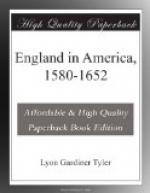Two defects were apparent in this constitution: the federal government had no authority to act directly upon individuals, and thus it had no coercive power; the equal number of votes allowed the members of the confederation in the federal council was a standing contradiction of the measure of contribution to the burdens of government. The confederacy contained a population of about twenty-three thousand five hundred souls, of which number fifteen thousand may be assigned to Massachusetts, three thousand each to Connecticut and Plymouth, and two thousand five hundred to New Haven. Massachusetts, with two out of eight commissioners, possessed a population greater than that of the other three colonies combined.
There was really no Indian combination in 1643 against the colonists, but the rivalry between the Narragansetts and the Mohegans gave grounds for uneasiness. After the death of Miantonomoh, under the circumstances already related, the fear of an Indian attack was temporarily removed. But the Narragansetts were grief-stricken over the loss of their chieftain and thought only of revenge upon the hated Uncas and his Indians, at whose door they laid all the blame. To give opportunity for intended operations, they made Gorton and others intermediaries for a complete cession of their country to the king of England in April, 1644. Then, when summoned by the general court of Massachusetts to Boston, Canonicus and Pessacus, the two leading chiefs, pleaded the king’s jurisdiction and declined to appear.[4] Two envoys sent by the general court in May, 1644, to the wigwam of Canonicus, were compelled to stay out in the rain for two hours before being admitted, and Pessacus, instead of giving them satisfaction, persisted in his threat of hostilities against Uncas, agreeing only not to attack Uncas “till after next planting-time,” nor then till after due notice given to the English.[5]
The truce did not restrain the Narragansetts, and in the spring of 1645 they attacked the Mohegans and defeated them, and thereupon the federal commissioners, in July, 1645, met at Boston, and upon the refusal of the Narragansetts to make peace with Uncas they made preparations for war. A force of three hundred men was raised, one hundred and ninety from Massachusetts, forty each from Plymouth and Connecticut, and thirty from New Haven.




